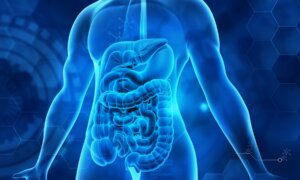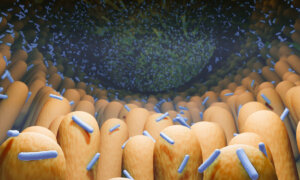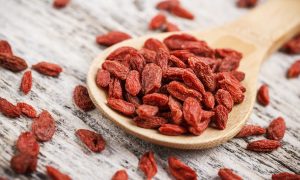As a personal chef, James Barry is quite interested in how food hits the sensory organs—does it smell tantalizing? Are the colors appealing? Will the recipient begin thinking about the dish even before the first bite? Will the flavors explode on the tongue?
Most Americans have some familiarity with how the senses can create a desire for—and potentially addiction to—food. Eating is preceded by the cephalic phase of digestion, which is triggered by smells, sounds, tastes, and even memories.
“Cephalic” comes from the Greek word kephalikos, which means pertaining to the head. It describes our first phase of digestion—everything that happens before we swallow our food.
Modern lifestyle has poked many holes in the cephalic phase of digestion. On one hand, mindlessness and busyness can cause us to rush through this phase during our meals, potentially spelling problems with our digestion and overall health.
On the other hand, ultra-processed food manufacturers have used the cephalic phase of digestion—along with the appeal of convenience—to create hyper-palatable options that seem capable of changing how we perceive food.
“What the ultra-processed food companies may be counting on is that we might automate the cephalic digestive process, rather than enjoy the slow appeal of a well-prepared meal,” Mr. Barry told The Epoch Times.
While our cephalic digestion stage is subject to the pressures of modern life, it may also hold the keys to resetting our palate and breaking our harmful eating habits that could put us at risk of food addiction and disease.
Too Busy to Enjoy Eating
We can’t blame all of our digestion problems on ultra-processed food. We’ve also lost many of our mindful habits around eating that facilitate digestion, according to Robin Fillner, an oncology nurse at Salinas Valley Health and certified functional nutritional counselor. She told The Epoch Times that the hectic American lifestyle may be working against us when it comes to digestive health.
“A lot of modern-day living makes us need to get more work done and faster, and eating just becomes something that gets in the way. We eat while we’re driving. We eat while we’re busy typing away on our computers,” Ms. Fillner said.
Ultra-processed foods fill a need for convenience driven by our busyness. And the companies that make them have engineered their ingredients to have the very flavors—particularly salty and sweet—and textures, smells, and colors that appeal to our first phase of digestion.
Research, however, shows three uncomfortable truths about relying on ultra-processed food:
- It can be as addictive as cigarettes and cocaine, according to a 2020 article in Nutrients.
- We are eating more and more of it. A study published in the American Journal of Clinical Nutrition in 2022 noted that most of the population’s intake of ultra-processed foods has continuously increased over the past two decades.
- It can change the way our cephalic system operates. A January 2024 study in Molecular Metabolism found that a short-term highly processed diet negatively affected smell, brain responses to smell, biochemistry in the nasal mucosa and the brain, and brain glucose metabolism in mice.
“Even short periods of highly processed food consumption are sufficient to cause early olfactory and brain abnormalities, which has the potential to alter food choices and influence the risk of developing metabolic disease,” the study concluded.
Getting to Know the Cephalic System
The cephalic process depends on reflexes. A classic example of this is the famous Pavlov’s dog experiment that illustrated how the sound of a bell stimulates saliva production. In other words, our body learns to respond to cues such as the smell, appearance, sounds, and tastes of food.
The first of three phases of digestion, the cephalic stage is like an alarm that wakes up the entire system to prepare itself for receiving a meal.
“In more traditional times people would sit down together for a meal at the table and they would take their time waiting for all the dishes to come to the table, and in that process, they’re looking at the food and smelling it and having conversations together,” Ms. Fillner said. “Inside our body, we’re revving up the engines getting ready to go, and then when we do eat, our body is more prepared for it.”
The Power of the Mind
A 2020 paper in Appetite concluded that cephalic-phase responses—our thoughts included—can power not only digestive functions but also metabolic ones because they can cause the release of insulin.
One review published in 2021 in Neuroscience & Biobehavioral Reviews noted several findings related to the cephalic phase, including:
- Merely talking about food can trigger the release of insulin before food is consumed.
- Ghrelin levels decreased more among participants who thought they drank a high-calorie shake than among those who thought they drank a low-calorie shake, despite the shakes actually being the same. Ghrelin is sometimes called the “hunger hormone,” and it signals the appetite so we will eat.
- In animal studies, cephalic responses disappeared when the animals’ vagus nerves were removed.
- Human research involving a drug that blocks the vagus nerve stopped the cephalic insulin response.
Calming the Nervous System
The nervous system—particularly the vagus nerve—acts as the conduit between our senses and our digestive organs. It’s a component of the parasympathetic—or “rest and digest”—nervous system, which sends messages to the stomach and other digestive organs to do their jobs.
Eating when you’re stressed, frustrated, angry, or even distracted could be counterproductive to digestion, according to Ms. Fillner. Such emotions can activate the sympathetic—or “fight, flight, freeze”—nervous system and divert blood flow away from the digestive organs.
This may explain constipation, loose stool, and pain during elimination, she said.
“I read that breath is the only conscious way we can control the nervous system. If you took two long, deep breaths every time you ate, I wonder how that would affect your digestion over time,” Ms. Fillner said.
She also suggested saying a prayer or expressing gratitude before eating, getting adequate sleep, and practicing regular stress relief activities such as meditation, yoga, breathing exercises, and enjoyable physical activity.
You can also be more mindful when experiencing cravings, pausing to consider whether you are experiencing hunger pain, you are thirsty, or something else is going on. The wonderful thing about the cephalic phase of digestion is that it offers a lot of opportunities to improve health, Ms. Fillner said.
“It fascinates me to no end. That’s what I want to pass on to my patients and maybe people who read what I write—how amazing it all is and it makes such a big difference,” she said.
More Cephalic Manipulation
We may also need to reset taste buds that have been either overstimulated or desensitized—a process that could be a bit lengthy, according to Mr. Barry.
He said he believes that one reason we are disconnected from what our bodies need is food that deviates from what is found in nature. For instance, he said an apple tastes nothing like its concentrated flavor, which might also have been enhanced by other ingredients. That is like 50 juiced apples boiled down to one teaspoon of fabricated flavor.
“Our bodies are confused; of course they are,” he said. “Nutrition is what tells your body to stop [eating]. It’s a major, major issue if you’re someone who’s struggling with your weight because you overeat. There’s a part of me that’s like we can’t blame ourselves because we’re being manipulated.”
We can recalibrate the cephalic system to natural flavors by adding in 10 percent of a new flavor or food and then working up gradually, Mr. Barry said.
It’s a concept that he’s so confident about that he created a product around it. His Pluck Seasonings are made to have umami, or savory, flavor—one of the five basic tastes that include sweet, sour, salty, and bitter —with organ meats and complementary spices and herbs. The seasoning allows him to use flavor to achieve his overarching mission of creating nutrient-rich dishes.
“Most of us in the U.S. skew toward salty-sweet. That’s because almost everything you’re going to buy from a grocery store is salty or sweet. That’s one of the ways they preserve food, shelf stability, and they are very cheap,” he said. “We’re in a country where the government does not care about our health. What I try to focus on is ‘What do I have control of?’”
Controlling What You Can
Regaining power is vital for the cephalic phase of digestion, which has a trickle-down effect on overall digestion and health, according to Mr. Barry. He offered the following tips:
- “Vote” with your pocketbook. “If we stop buying the thing they are making, they will pivot, because they just want to make money,” he said.
- Don’t bring foods into your house that you really don’t want to eat. “If it’s in the house, I will find some reason to eat it,” he said. “I’m not about to get in my car and go get it because it’s not that strong of an impulse for me. So I drink some water or go for a walk and I just have to be in the feelings that come up that are motivating me to want that thing.”
- Don’t let the pendulum swing so far that you aren’t enjoying your life, you avoid all temptation, or you never socialize. “If you’re living this half a life, that’s not healthy either,” he said. “To me, it’s about finding the balance, and the balance is found when we create habits that serve our desired outcome. It’s different for everybody.”
- Be diligent and responsible about the food that you eat based on what motivates you. “I want to live as long as possible to be a part of my kids’ lives,“ he said. ”I want to be a functional human being as I age. I want to be healthy enough to be in their lives, not in a bed where they come to visit me, but where I’m actively a part of their lives.”














